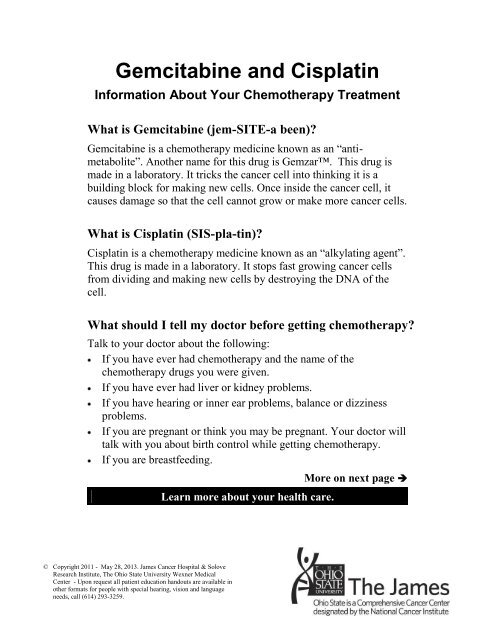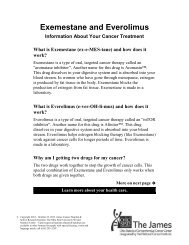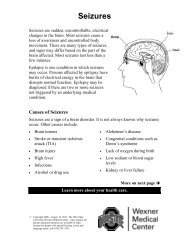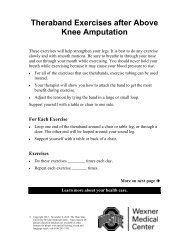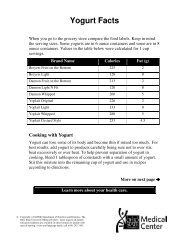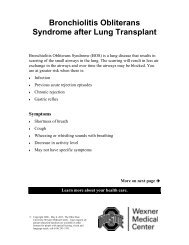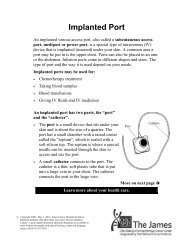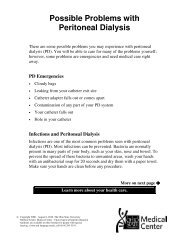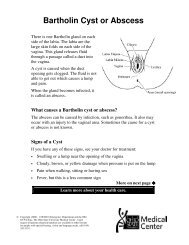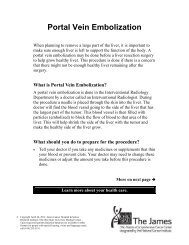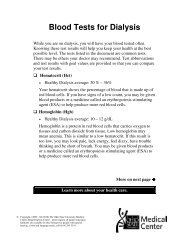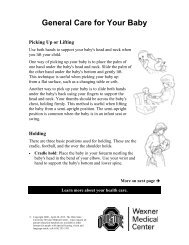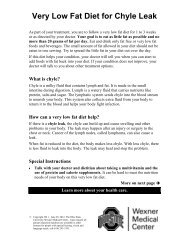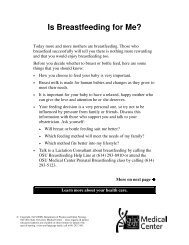Gemcitabine and Cisplatin - Patient Education Home
Gemcitabine and Cisplatin - Patient Education Home
Gemcitabine and Cisplatin - Patient Education Home
You also want an ePaper? Increase the reach of your titles
YUMPU automatically turns print PDFs into web optimized ePapers that Google loves.
<strong>Gemcitabine</strong> <strong>and</strong> <strong>Cisplatin</strong><br />
Information About Your Chemotherapy Treatment<br />
What is <strong>Gemcitabine</strong> (jem-SITE-a been)?<br />
<strong>Gemcitabine</strong> is a chemotherapy medicine known as an “antimetabolite”.<br />
Another name for this drug is Gemzar. This drug is<br />
made in a laboratory. It tricks the cancer cell into thinking it is a<br />
building block for making new cells. Once inside the cancer cell, it<br />
causes damage so that the cell cannot grow or make more cancer cells.<br />
What is <strong>Cisplatin</strong> (SIS-pla-tin)?<br />
<strong>Cisplatin</strong> is a chemotherapy medicine known as an “alkylating agent”.<br />
This drug is made in a laboratory. It stops fast growing cancer cells<br />
from dividing <strong>and</strong> making new cells by destroying the DNA of the<br />
cell.<br />
What should I tell my doctor before getting chemotherapy?<br />
Talk to your doctor about the following:<br />
If you have ever had chemotherapy <strong>and</strong> the name of the<br />
chemotherapy drugs you were given.<br />
If you have ever had liver or kidney problems.<br />
If you have hearing or inner ear problems, balance or dizziness<br />
problems.<br />
If you are pregnant or think you may be pregnant. Your doctor will<br />
talk with you about birth control while getting chemotherapy.<br />
If you are breastfeeding.<br />
© Copyright 2011 - May 28, 2013. James Cancer Hospital & Solove<br />
Research Institute, The Ohio State University Wexner Medical<br />
Center - Upon request all patient education h<strong>and</strong>outs are available in<br />
other formats for people with special hearing, vision <strong>and</strong> language<br />
needs, call (614) 293-3259.<br />
Learn more about your health care.<br />
More on next page
Page 2<br />
If you have been told that you need to start a new medicine.<br />
The medicines/pills you are taking, including:<br />
Medicines prescribed by any of your doctors<br />
Herbs<br />
Vitamins<br />
Over-the-counter medicines<br />
How does my doctor decide my chemotherapy dose?<br />
To determine your treatment dose, your doctor will review the<br />
following: your stage of cancer, your height, your weight, your<br />
medicines, how well your liver <strong>and</strong> kidneys are working, <strong>and</strong> any<br />
other health problems you have. This chemotherapy is normally given<br />
one day per week for 2 weeks in a row, followed by a week off. You<br />
will see the doctor or nurse practitioner about once every 3 weeks<br />
when you are getting this treatment.<br />
Should I eat or drink before my treatment?<br />
It is best to eat a small meal before getting your chemotherapy.<br />
Drinking plenty of non-caffeinated fluids may also be helpful.<br />
However, if you have been told to limit fluids, check with your doctor<br />
about how much you can drink.<br />
How will my treatment be given?<br />
You will be given medicine 30 to 60 minutes before your treatment to<br />
prevent nausea <strong>and</strong> vomiting. You may also receive IV fluids before<br />
or after receiving your <strong>Cisplatin</strong>. This extra fluid will help protect<br />
your kidneys from damage that can be caused by this drug.<br />
<strong>Gemcitabine</strong> is given directly into your blood stream through a tube<br />
(IV) placed in your arm or chest. <strong>Gemcitabine</strong> comes in a bag with<br />
tubing attached. The nurse will connect the tubing to a pump. This<br />
treatment takes 30 minutes.<br />
<strong>Cisplatin</strong> is given directly into your bloodstream through a tube (IV)<br />
placed in your arm or chest. <strong>Cisplatin</strong> comes in a large bag with
tubing attached. The nurse will connect the tubing to a pump. This<br />
treatment takes 1 to 3 hours depending on the dose of <strong>Cisplatin</strong>.<br />
Your entire visit, including your doctor’s appointment <strong>and</strong> your<br />
treatment will take between 3 to 6 hours.<br />
What are the side effects of this treatment?<br />
Every person responds differently to treatment. Some of the more<br />
common side effects of this chemotherapy are:<br />
Page 3<br />
Fever, chills <strong>and</strong> aches on the day you receive your <strong>Gemcitabine</strong>,<br />
this is not caused by infection.<br />
Nausea <strong>and</strong>/or vomiting lasting for several days after<br />
chemotherapy<br />
Numbness, tingling <strong>and</strong> pain in h<strong>and</strong>s <strong>and</strong> feet<br />
Fatigue<br />
Weakness<br />
Thinning of your hair<br />
Mouth pain or open sores in the mouth<br />
Damage to your kidneys<br />
Increase in enzymes made by your liver (your doctor will check<br />
your blood to monitor how your liver is working)<br />
Diarrhea<br />
Rash or itching<br />
Swelling in h<strong>and</strong>s, ankles or feet<br />
Difficulty breathing or wheezing<br />
Ringing in the ears, dizziness, balance problems<br />
Low white blood cell count (may increase your risk for infection)<br />
Low hemoglobin (may cause you to have less energy <strong>and</strong> tire more<br />
easily)<br />
Low platelet counts (may cause you to bleed more easily or longer<br />
than normal <strong>and</strong> have more bruising)
Page 4<br />
Decrease in the amount of electrolytes in your bloodstream (your<br />
doctor will check your blood at times during your treatment to<br />
monitor the amount of electrolytes in your blood)<br />
When should I call my doctor?<br />
You should call your doctor right away if you have any of the<br />
following signs or symptoms:<br />
Signs of an allergic reaction, including:<br />
Difficulty breathing, wheezing, chest pain or tightness<br />
Swelling of your face, lips, tongue, or throat<br />
Rash<br />
Fever of 100.4 degrees Fahrenheit (38 degrees Celsius) or higher<br />
A fever can be life-threatening if not treated. Your doctor<br />
may ask you to go to the hospital.<br />
Chills, sore throat, cough or a wound that does not get better<br />
Open sores in your mouth<br />
Nausea that prevents you from eating or drinking<br />
Vomiting even after you have taken your anti-nausea medicine<br />
Bleeding or bruising, including bloody or black stools or blood in<br />
your urine<br />
Diarrhea (4 or more loose stools in 24 hours)<br />
Shortness of breath or difficulty breathing<br />
Swelling in h<strong>and</strong>s, feet or ankles<br />
Fast weight gain<br />
Changes in urine, dark urine, or no urine output for more than 12<br />
hours<br />
Yellowing of skin or eyes<br />
Changes in hearing or balance<br />
Severe muscle cramps or twitching
Page 5<br />
Is there anything else I should know about this treatment?<br />
Some patients may have an allergic reaction while <strong>Cisplatin</strong> is<br />
being given or within a day or two after receiving treatment.<br />
If an allergic reaction happens during your treatment, the nurse<br />
will give you medicine to help manage the reaction <strong>and</strong> extra<br />
precautions will be taken when your next treatment is given.<br />
You may also have a delayed allergic reaction a day or two<br />
after treatment. You will be given instructions on what to do if<br />
this happens.<br />
Chemotherapy may make it harder for your body to fight infections.<br />
Wash your h<strong>and</strong>s often <strong>and</strong> avoid people who are sick.<br />
This treatment requires special precautions to prevent the<br />
chemotherapy drugs from coming into contact (through blood,<br />
urine, bowel movements, vomit <strong>and</strong> vaginal or seminal fluids) with<br />
others. Your chemotherapy nurse will give you guidelines to<br />
follow for 48 hours after receiving chemotherapy.<br />
Chemotherapy can change how your body reacts to vaccines. Talk<br />
to your doctor before getting any vaccines.<br />
You should drink 8 to 10 eight-ounce glasses of non-caffeinated<br />
fluid each day throughout your treatment. This is important to keep<br />
you hydrated while you are receiving chemotherapy.<br />
This treatment may affect your ability to have children. Talk to<br />
your doctor before getting chemotherapy if you are planning to<br />
have children in the future.<br />
For more information about cancer, chemotherapy, side effects or how<br />
to care for yourself during treatment, refer to your Chemotherapy<br />
<strong>and</strong> You book, or ask your doctor, nurse or pharmacist.<br />
Talk to your doctor or others on your health care team if you<br />
have questions. You may request more written information<br />
from the Library for Health Information at (614) 293-3707 or<br />
email: health-info@osu.edu.


